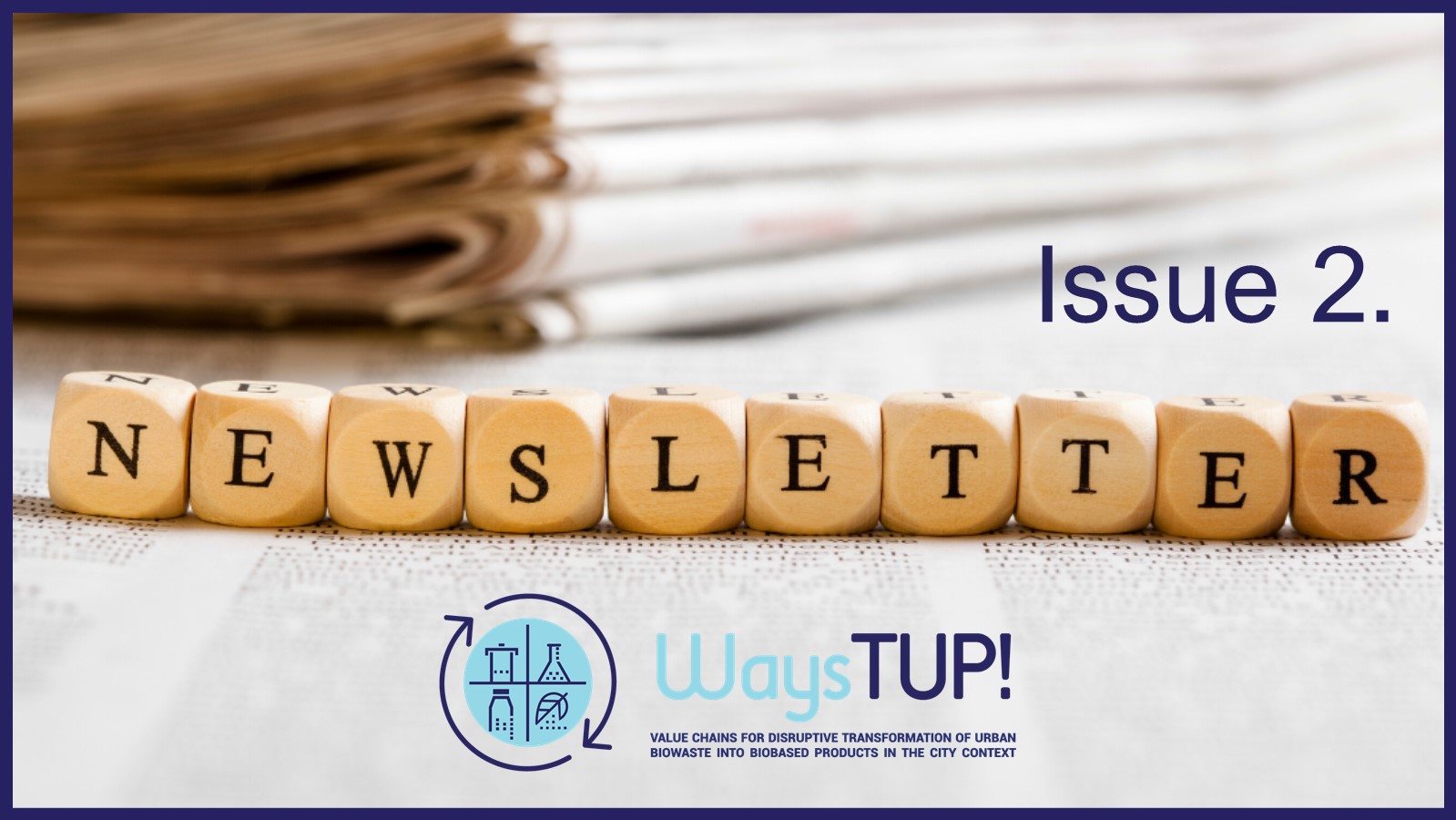 Editorial
Editorial Welcome back to our second WaysTUP! newsletter!
Welcome back to our second WaysTUP! newsletter!
In this issue you can find out about the progress of the project and its pilots, as well as get insights from our recent virtual meeting.
We also introduce you to our sister projects and present selected project news and forthcoming events.
Ben Mills-Lamptey (bio-bean Ltd) explains in simple words how can coffee waste be turned into valuable products in our Coffee Oil pilot.
Stay UPdated on WaysTUP! by visiting our website and don’t forget to follow us on social media.
 Project progress
Project progressWaysTUP! celebrated its first birthday in August 2020. The project aims to demonstrate the establishment of new value chains for urban biowaste utilisation to produce higher value purpose products (i.e. biobased products, including food and feed ingredients), through a multi-stakeholder approach in line with circular economy.
Click each image to find out more on what we have accomplished during this first year of implementation…
 2nd project meeting snaps
2nd project meeting snapsThe WaysTUP! project meeting took place on the 22nd and 23rd of September 2020, with more than 55 participants being online, representing all 26 partners…
The project partners presented their progress and discussed future plans to meet the objectives of the work packages. Pilar Vizcaino, the project’s officer, also participated in the virtual project meeting. The officer focused on the difficulties encountered due to the Covid-19 crisis and its effect on the project progress.
Partners developed a plan for near-term tasks to ensure that they feed into long-term project objectives and received feedback from the project’s Coordination team on the project implementation.
The first day included the presentation of the progress in 5 Work Packages:
On the second day, the meeting concluded with the presentation of the progress of the remaining 4 Work Packages:
 Sister projects
Sister projects WaysTUP! is working along other Horizon projects that also demonstrate the establishment of new value chains for urban biowaste utilization. We are very happy to present our sister projects that innovate on waste management schemes to create new value chains from urban biowaste.
VALUEWASTE (Unlocking new value from urban biowaste) proposes an integrated approach in urban biowaste upcycling for the production of high-value bio-based products, developing the first complete solution to fully valorise biowaste that can be replicated across Europe. The project started on November 2018, it will last 4 years and gathers 17 partners from 6 different countries.![]() www.valuewaste.eu
www.valuewaste.eu
 In the SCALIBUR project (Scalable Technologies for Bio-urban Waste Recovery), leading waste management companies, technology developers and research organisations have teamed up with four European cities to demonstrate innovative solutions to transform urban food waste and sewage sludge into high value-added products, helping cities to increase their recycling rate and creating new circular economy business opportunities. The SCALIBUR project began in November 2018 and will run for four years until October 2022. The project involves 21 partners from 8 countries.
In the SCALIBUR project (Scalable Technologies for Bio-urban Waste Recovery), leading waste management companies, technology developers and research organisations have teamed up with four European cities to demonstrate innovative solutions to transform urban food waste and sewage sludge into high value-added products, helping cities to increase their recycling rate and creating new circular economy business opportunities. The SCALIBUR project began in November 2018 and will run for four years until October 2022. The project involves 21 partners from 8 countries. ![]() www.scalibur.eu
www.scalibur.eu
 An insider’s view
An insider’s view bio-bean Limited is the world’s largest recycler of spent coffee grounds (SCG), transforming thousands of tonnes annually into valuable bio-products in the form of solid biofuels and a natural flavour extract.
bio-bean Limited is the world’s largest recycler of spent coffee grounds (SCG), transforming thousands of tonnes annually into valuable bio-products in the form of solid biofuels and a natural flavour extract.
Through our innovative coffee recycling solutions, we reduce waste, save businesses money, decrease greenhouse gas emissions, and contribute to the circular economy.
We are delighted to be working with international partners within the Horizon 2020 WaysTUP! project, in which we are extracting coffee oil from spent grounds for use as feedstock to produce pre-cursors for bioplastics. We hope to increase our understanding of coffee oil extraction from lab through to industrial scales, and to deliver a high-quality feedstock to our partners, Nafigate.
 Spent coffee grounds have significant residual potential, and here at bio-bean we have harnessed that potential by developing and commercialising a number of products, including:
Spent coffee grounds have significant residual potential, and here at bio-bean we have harnessed that potential by developing and commercialising a number of products, including:
(1) Solid fuels: Namely Coffee Logs (a domestic winter fire log), and biomass pellets for use in industrial/commercial scale boilers.
(2) Natural flavours: Through our unique, certified supply chain model ensuring spent grounds remain within the food chain, we’ve created natural flavouring products extracted from these spent grounds. Our first aqueous-based flavour, bb-NUF/A, for application in food and beverage manufacturing was launched in Nov 2019.
Coffee Logs are positioned on the market for consumers who wish to heat their homes with less of an impact on the environment. The logs are available in retailers across the UK, including DIY stores, supermarkets, garden centres and online retailers. They come in 8kg bags – 16 logs in each bag – with a convenient carry handle, made from fully recyclable packaging. For more information on our consumer retail fuel log, visit the Coffee Logs website.
NUF/A, our coffee flavour extract, is marketed to major ‘flavour houses’ around the world who wish to deliver sustainable, natural flavouring ingredients in foods and beverages. Our coffee extracts provide flavourists, formulators and manufacturers with improved environmental performance, clean labelling and the potential for unique flavour profiles.
The UK alone drinks 95 million cups of coffee every day, creating up to 500,000 tonnes of waste coffee grounds every year. Typically, these grounds are sent to either anaerobic digestion (AD), or to landfill. However, both disposal methods pose a risk to our environment, as compounds within the spent grounds have been shown to dramatically decrease the pH of the environments where they have been disposed of.
 In AD plants, changes in pH can significantly hinder the performance of the microbes doing the work. In fact, several AD plants prefer not to accept coffee waste for this reason alone.
In AD plants, changes in pH can significantly hinder the performance of the microbes doing the work. In fact, several AD plants prefer not to accept coffee waste for this reason alone.
And when coffee is sent to landfill it contributes to harmful greenhouse gas emissions, as with any organic waste in landfill. Also, as mentioned above, changing the pH of the surrounding area, the leachate from spent grounds can harm the soil and groundwater conditions, leaving long-lasting negative effects on the land.
An independent, third-party analysis on our processes has shown that by recycling spent grounds into Coffee Logs, we save 80% on CO2e emissions compared to the grounds going to landfill, and 70% versus AD.
 The WaysTUP! circular
The WaysTUP! circular The WaysTUP! project has recently become a project partner of the EuBioNet. The European Bioeconomy Network -EuBioNet is a proactive alliance of EU funded projects dealing with Bioeconomy promotion, communication and support. The main goal is to maximise the efforts, increasing the knowledge sharing, networking, mutual learning, coordination of joint activities and events. The Network works in close collaboration with the European Commission and BBI JU, to ensure that the objectives identified by the Bioeconomy Strategy update will be effectively communicated, addressed, and implemented. Click here for more info.
The WaysTUP! project has recently become a project partner of the EuBioNet. The European Bioeconomy Network -EuBioNet is a proactive alliance of EU funded projects dealing with Bioeconomy promotion, communication and support. The main goal is to maximise the efforts, increasing the knowledge sharing, networking, mutual learning, coordination of joint activities and events. The Network works in close collaboration with the European Commission and BBI JU, to ensure that the objectives identified by the Bioeconomy Strategy update will be effectively communicated, addressed, and implemented. Click here for more info.
![]() RECYCLING MAGAZINE featured WaysTUP! mission and progress.
RECYCLING MAGAZINE featured WaysTUP! mission and progress.
CORDIS, the Community Research and Development Information Service has announced the WaysTUP! project on its news section.
![]() WaysTUP! and its mission was presented on the article “Bio-waste is not waste anymore” at HortiBiz news portal.
WaysTUP! and its mission was presented on the article “Bio-waste is not waste anymore” at HortiBiz news portal.
 On the 29th of September 2020 we celebrated the First International Day of Awareness of Food Loss and Waste (IDAFLW). An online event was as such organized in order to raise awareness of the importance of the food loss and waste problem and its possible solutions at all levels in a bid to promote global efforts and collective action toward meeting Sustainable Development Goal (SDG) target 12.3 (by 2030 halve per capita global food waste at the retail and consumer level, and reduce food losses along production and supply chains, including post-harvest losses). In this global virtual meeting Heads of FAO and United Nations Environment Programme shared their perspectives on the issues and actions required to stem the problem. A high-level panel provided their perspectives, and roundtable panelists from across the food system discussed critical issues and challenges as well as opportunities to accelerate action to reduce food loss and waste. Click here for more info.
On the 29th of September 2020 we celebrated the First International Day of Awareness of Food Loss and Waste (IDAFLW). An online event was as such organized in order to raise awareness of the importance of the food loss and waste problem and its possible solutions at all levels in a bid to promote global efforts and collective action toward meeting Sustainable Development Goal (SDG) target 12.3 (by 2030 halve per capita global food waste at the retail and consumer level, and reduce food losses along production and supply chains, including post-harvest losses). In this global virtual meeting Heads of FAO and United Nations Environment Programme shared their perspectives on the issues and actions required to stem the problem. A high-level panel provided their perspectives, and roundtable panelists from across the food system discussed critical issues and challenges as well as opportunities to accelerate action to reduce food loss and waste. Click here for more info.
On this day the UN Secretary-General Antonio Guterres said: “While many countries are taking action, we need to step up efforts, highlighting that the inaugural observance of the International Day of Awareness of Food Loss and Waste comes as the world prepare for the 2021 Food Systems Summit. I urge countries to set a reduction target aligned with SDG 12, measure their food loss and waste and act boldly to reduce it. Policy action in this area should also be included in climate plans under the Paris Agreement [on Climate Change]. Many businesses should take a similar approach, calling on Individuals to shop carefully, store food correctly and make good use of leftovers. Let us work together to reduce food loss and waste for the benefit of people and our planet.” [SOURCE].
 The European Circular Cities Declaration is designed to help accelerate the transition from a linear to a circular economy in Europe, and thereby create a resource-efficient, low-carbon and socially responsible society. The Declaration has been developed by a broad partnership of stakeholders to ensure that the vision and commitments contained are ambitious, yet achievable, and reflect the needs of all. Major European cities, currently 28, have joined forces to support and act on the transition to a circular economy and signed the European Circular Cities Declaration. The Declaration was launched at the 9th European Conference on Sustainable Cities & Towns – Mannheim2020, at the policy panel Circular Economy in Cities. Signatories recognise the need of accelerating the transition from a linear to a circular economy in Europe, and are committed to act as ambassadors and champion a circular economy that leads to a resource-efficient, low-carbon and socially responsible society, in which resource consumption is decoupled from economic growth. Click here to find out more.
The European Circular Cities Declaration is designed to help accelerate the transition from a linear to a circular economy in Europe, and thereby create a resource-efficient, low-carbon and socially responsible society. The Declaration has been developed by a broad partnership of stakeholders to ensure that the vision and commitments contained are ambitious, yet achievable, and reflect the needs of all. Major European cities, currently 28, have joined forces to support and act on the transition to a circular economy and signed the European Circular Cities Declaration. The Declaration was launched at the 9th European Conference on Sustainable Cities & Towns – Mannheim2020, at the policy panel Circular Economy in Cities. Signatories recognise the need of accelerating the transition from a linear to a circular economy in Europe, and are committed to act as ambassadors and champion a circular economy that leads to a resource-efficient, low-carbon and socially responsible society, in which resource consumption is decoupled from economic growth. Click here to find out more.
 Stats for chats
Stats for chatsAccording to the Statistics analysis on waste generation (European Environment Agency) more and more waste is being generated in Europe. Between 2010 and 2016, total waste generation increased by 3.0% (almost 74.7 million tonnes) in the EU-28 countries. In 2016 the water and waste (28.0%), households (23.0%) and manufacturing (21.0%) sectors generated the largest shares of waste. These three sectors together produce almost 72 % of all waste, excluding major mineral wastes.
Between 2010 and 2016, waste generation in the water and waste sector increased by 56% (almost 82 million tonnes). This significant growth was driven mainly by secondary waste generation from the development of waste management systems in countries with growing waste treatment operations. In other sectors, the trend was gradually decreasing.
WaysTUP! pilots PERSEO BIOETHANOL® and BIOCHAR are working towards valorising waste from wastewater treatment plants.
SOURCE: European Environment Agency
 Forthcoming events
Forthcoming events
The Circular Economy Stakeholder Conference![]() 3-4 November 2020
3-4 November 2020 ![]() online
online
This conference is an initiative of the European Commission and the European Economic and Social Committee. The 2020 edition will focus on the new Circular Economy Action Plan and the first phase of its implementation. More ![]()
The Circular Economy Hotspot ![]() 6-19 November 2020
6-19 November 2020 ![]() Barcelona, Spain
Barcelona, Spain
The Circular Economy Hotspot promotes the exchange of ideas and experiences between policymakers, entrepreneurs, researchers and industrialists. The globetrotting event aims at highlighting the circular economy practices in different cities every year. Circular design, bioeconomy, industry 4.0 and inclusive circularity are among the themes of the four-day event. More ![]()
 The Global Bioeconomy Summit
The Global Bioeconomy Summit ![]() 16-20 November 2020
16-20 November 2020 ![]() online
online
The third Global Bioeconomy Summit #GBS2020 will take place with the support of the German government. The goal of the conference is to globally review and discuss emerging opportunities and challenges of the bioeconomy and develop visions for the future development of a sustainable bioeconomy among key actors from governments, science and innovation, business, and civil society. The summit links bioeconomy policy closely to global sustainable development and climate agendas. More ![]()
 The 2020 European Biosolids & Organic Resources Conference & Exhibition
The 2020 European Biosolids & Organic Resources Conference & Exhibition![]() 24-25 November 2020
24-25 November 2020 ![]() online
online
The event will bring together bioresource and biowaste professionals from across the globe to provide an essential annual update on the latest innovations, best practice, cutting-edge technology and research in the wastewater and resource management industries. More ![]()
The 15th European Bioplastics Conference![]() 30 November – 3 December 2020
30 November – 3 December 2020 ![]() online
online
This year’s conference will focus on the latest innovations in bioplastics as well as on environmental aspects and opportunities for growth. The conference will gather senior decision makers from across the private sector bioplastics value chain, policy makers, leading research institutes, NGOs, and brand owners. The conference highlights the latest developments in the areas of bio-based and biodegradable materials and applications, bioplastics processing, end-of-life, sustainability and policy. More ![]()
 Join us
Join usThe WaysTUP! project counts 26 partners, each expert in their field, collaborating to transform urban bio-waste into valuable end products.
Our experts will be more than happy to answer to your questions or provide more info on the project.
Project Coordinator: Belén Miranda, innova@sav-lavega.com
Subscribe to our newsletter: